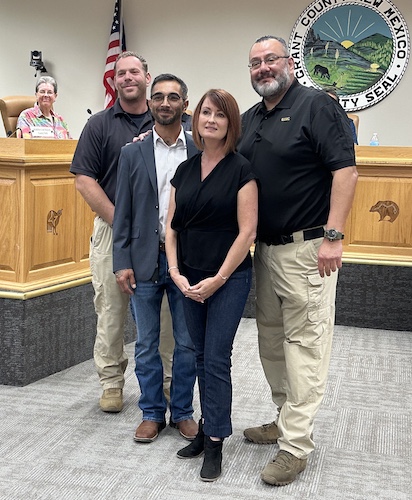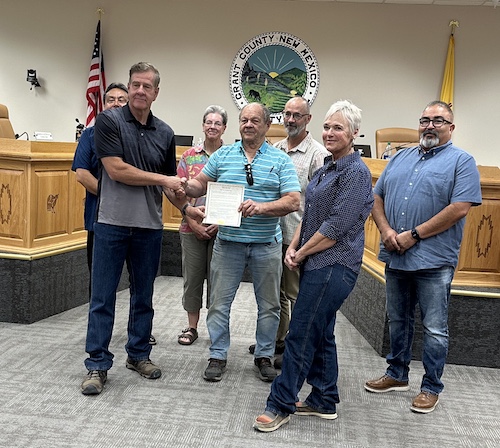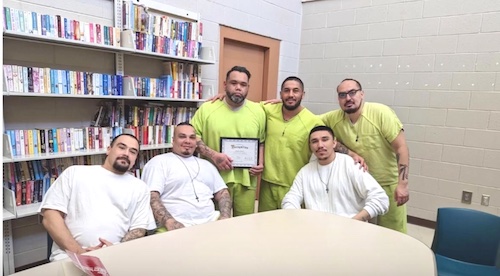Grant County Commission work session 061124 and reg mtg 061324 part 6
[Editor's Note: This is the sixth of a series of articles on the June 11, 2024 Commission meeting and the June 13 regular meeting. It continues the work session review of the regular meeting agenda and decisions made at that meeting.]
Photos and article by Mary Alice Murphy
 R.I.S.E. program team, Lt. Bonenfant, Ronald Hartley, Paula Rouse and Detention Center Administrator Joseph Andazola.
R.I.S.E. program team, Lt. Bonenfant, Ronald Hartley, Paula Rouse and Detention Center Administrator Joseph Andazola.
 Commissioner Billy Billings presents proclamation for Wild, Wild West Rodeo to recipients as other commissioners join in.
Commissioner Billy Billings presents proclamation for Wild, Wild West Rodeo to recipients as other commissioners join in.
Detention Center Administrator Joseph Andazola recognized three individuals in the second presentation of the June 13, 2024 Grant County Commission regular meeting
He gave an overview of the R.I.S.E. (Reach, Intervene, Support and Engage) Program, which has served the county for several years. "The Detention Center took it over in 2022, and we did a reset in 2023. I want to introduce our staff."
Andazola introduced Paula Rouse, who said she was a treatment provider and discharge planner for the Grant County R.I.S.E. program.
Ronald Hartley is the director of peer support services for the R.I.S.E. program. Lt. Bonenfant serves as administrative lieutenant and program administrator for the R.I.S.E. program for Grant County.
Andazola said also part of the R.I.S.E. program team is Jim Helgert who was unable to attend. He is the oversight and supervisor for the R.I.S.E. personnel.
His presentation continued with the Mission statement for the program, which is to reduce recidivism among residents of Grant County by helping, teaching and providing them with techniques, tools and life skills during and after their incarceration to help them successfully navigate life after the release from the Detention Center. "We do this by treating them with Respect, helping them improve their Integrity and providing Stewardship for them to grow to create Self-Efficiency in life."
He noted R.I.S.E. is a grant-funded pilot program through the state Behavioral Health Services Division (BHSD), and it follows the federal SAMHSA's (Substance Abuse and Mental Health Services Administration) sequential intercept model approach. The goal is to divert people with mental health disorders from the criminal justice system. He said the program and its model were similar to what they used in the former Stepping Up Program. "Grant County and a lot of you are also working to stop them from even going into the Detention Center."
Bonenfant said referrals for the R.I.S.E program are accepted through the GCDC administration staff, the district and magistrate courts, the district attorney's office, the public defenders office or private attorney, the adult probation and parole department, DWI compliance, Road Runner Health Services and self-referral through an in-pod kiosk, which offers voice, video and mail services to communicate with inmates.
Andazola said the target population includes offenders who are in and out of the detention center and who are struggling with substance abuse, individuals who will transition back to the community under community supervision, and those who have not exhausted all other alternative treatment options. The minimum length of stay in the R.I.S.E program is at least 30 days, who can be handed off to other community services, but preferably 90 days for the program design. Also under consideration are non-violent offenders with individual histories and current charges that can be reviewed. No sex offenders will be accepted into the program. Those who have a readiness for changes by accepting the program as offered and participating as asked are part of the target population.
He said each individual is interviewed and determined for eligibility and their readiness for change. Each week, the detention center staff meets with the community program staff for safety and security as well as final determination for the inmate. The detainee then has to go through a full assessment for basic needs to start preparing a plan for their discharge from the facility. The program includes individual substance abuse treatment, individualized treatment plans, peer support, recovery-focused groups, aftercare and discharge plan, substance abuse relapse prevention plan and continuity of care referrals to medical behavioral health and other community resources.
The Detention Center uses the TCU (Texas Christian University) brief interventions for the risk assessment, which includes getting motivated to change, unlock one's thinking and open one's mind, understanding and reducing angry feelings, ideas of better communications, building a social network and common sense ideas for HIV prevention and sexual health. The aftercare involves transition skills for recovery and treatment readiness and induction program, which puts them in the medically-assisted treatment program before handing them off to the community services. Finally, the case management and peer supporting their individualized discharge plan addresses the criminogenic factors identified during the assessment and aftercare treatment plan.
Bonenfant noted that the R.I.S.E program was approved as a "sentencing alternative" through the NM Adult Probation and Parole in 2021. "We worked hard with the state sentencing commission to get that through, so that if they complete the 90-day program, they can be released from jail." He said the aftercare services in the community are "awesome." Bonenfant also said that R.I.S.E. monitors recidivism of the participants for one year after the individual transitions back to the community. "We track them for a year or longer if they want to continue working with the program."
He said they do quarterly reports to the state BHSD, with data summary on the participant demographics, whether homeless or not, warm handoff to managed care organizations for behavioral health services including counseling, recovery groups, peer support and referral. Case management services include personal identification, education, employment, physical care, financial assistance, court appearances and communication with probation officers. He said they also address program accomplishments and barriers, the worst one at the moment being getting them identification cards through the state.
Rouse and Hartley showed photos of the facility where program aspects happen. Hartley also said that they can attend classes via Zoom. Rouse said the facility has a clothing section because many come into the facility literally with literally only the clothes on their back. Hartley said they are looking to hire another individual to be in the R.I.S.E. office five 8-hour days a week.
 This photo is a screenshot of a graduation ceremony at the facility. Hartley noted that all the men in the group gave their permission for the photo and "would love to see it in the newspaper."Hartley said some leave this area to go to long-term treatment upstate. Some of them have long sentences, but are allowed to stay in the facility because they have done well in the programs.
This photo is a screenshot of a graduation ceremony at the facility. Hartley noted that all the men in the group gave their permission for the photo and "would love to see it in the newspaper."Hartley said some leave this area to go to long-term treatment upstate. Some of them have long sentences, but are allowed to stay in the facility because they have done well in the programs.
He also said when the jail installs a new metal building at the Detention Center they will expand their services and involve the detainee's family in the program.
Andazola said: "We work hard to help these detainees, because they, too, are part of the community. We look forward to expanding the program with new ideas. We also appreciate the collaboration with other agencies on this program."
Bonenfant thanked the commissioners and the support of the county manager. "We've helped Luna County get their R.I.S.E program up and running. We're also working with Hidalgo County to get theirs going, too. We're planning a tri-county collaboration with all the counties."
District 3 Commissioner Alicia Edwards thanked the group for their effort. "I think everyone in the county saw the potential. I would like to thank the county manager for persevering and making sure we were able to continue to get the funding. You guys have done an awesome job. We are givng meaningful services to the community."
District 2 Commissioner Eloy Medina said he remembers going into the old jail, which was just a jail. "But I see so much progression for the inmates in this program and what you are doing to help them succeed. I really appreciate that you don't stop."
Andazola thanked them and said: "We have a really great team, but it includes all the other aspects; the medical and mental health services are a big part. We want to continue."
District 5 Commissioner Harry Browne also thanked them and asked if a comment about expansion is perhaps beyond the jail.
Andazola said he and Bonenfant attended a criminal justice conference with the state attorney general and got a lot of ideas. "It's going to take people at the community level to work together to help those who are in need. With that we are all working hard. I know the R.I.S.E program is working hard in the Legislature to make it permanent in the jails in New Mexico. With that, we could look at other sources of funding." He suggested they could work with the municipalities and create not just a R.I.S.E program center, but perhaps a community center, "so we can have them before they enter the criminal justice system." There is research going on at NMSU. "I retire in three years, but I'm thinking about going back to school to get my master's degree in social work or LSAA like Paula and continue to work in the community."
"Beautiful answer. I love the concept and will support it in any way," Browne replied.
Ponce asked what happens if a person does not complete the treatment program. "Can we engage them again?"
Rouse replied that they would be reassessing the plans to figure out where to go to connect the network for what can be done. "Are you talking about if we are still working with the individual?" Ponce confirmed that.
"We haven't seen a lot of pushback," Rouse said. "They are really inspired to be in the program. We talk about these things in team meetings. And we're going to ask them about what they need in their lives right now that's not working for them. Sometimes, we just have a conversation with them and inspire them again."
For the next agenda item, County Manager Charlene Webb read the proclamation for the First New Mexico Bank-sponsored Wild, Wild West Rodeo Week, which would take place for its 32nd year on June 17-23.
Commissioners approved the proclamation at the regular meeting.
The next item, which is given monthly, had no one from GRMC to give the report, because the administrators and board members were attending the New Mexico Hospital Association conference.
At the work session, Webb presented the financial report ending in June 4, 2024, which totaled $3,675,993.42, including three pay periods and a sheriff's office recruitment expenditure for $814,874.58.
The PDF of the extraordinary expenditures above $10,000 is below.
The next article will start with the elected official reports.
To read the previous articles, please visit: https://www.grantcountybeat.com/news/news-articles/grant-county-commission-work-session-061124-part- 1; https://www.grantcountybeat.com/news/news-articles/grant-county-commission-work-session-061124-part-2 ; https://www.grantcountybeat.com/news/news-articles/grant-county-commission-work-session-061124-part-3 ; https://www.grantcountybeat.com/news/news-articles/grant-county-commission-work-session-061124-part-4 ; and https://www.grantcountybeat.com/news/news-articles/grant-county-commission-work-session-061124-and-reg-mtg-061324-part-5










